Impact of Globalisation on Business and External Factors: A Report
VerifiedAdded on 2021/01/02
|10
|2805
|382
Report
AI Summary
This report examines the multifaceted impacts of globalisation on contemporary business environments. It begins with a definition of globalisation, tracing its evolution and the factors that have contributed to its success, including advancements in transportation and communication. The report then delves into external factors that shape globalisation, categorizing them into cultural, technological, and political dimensions. The cultural section explores how globalisation influences societal values, languages, and consumption habits, while the technological aspect highlights the role of the internet and smartphones in facilitating global interactions. Finally, the political dimension discusses the impact of government policies and international relations on business operations. The report concludes by synthesizing these factors to provide a comprehensive understanding of the challenges and opportunities presented by globalisation in the modern business landscape.
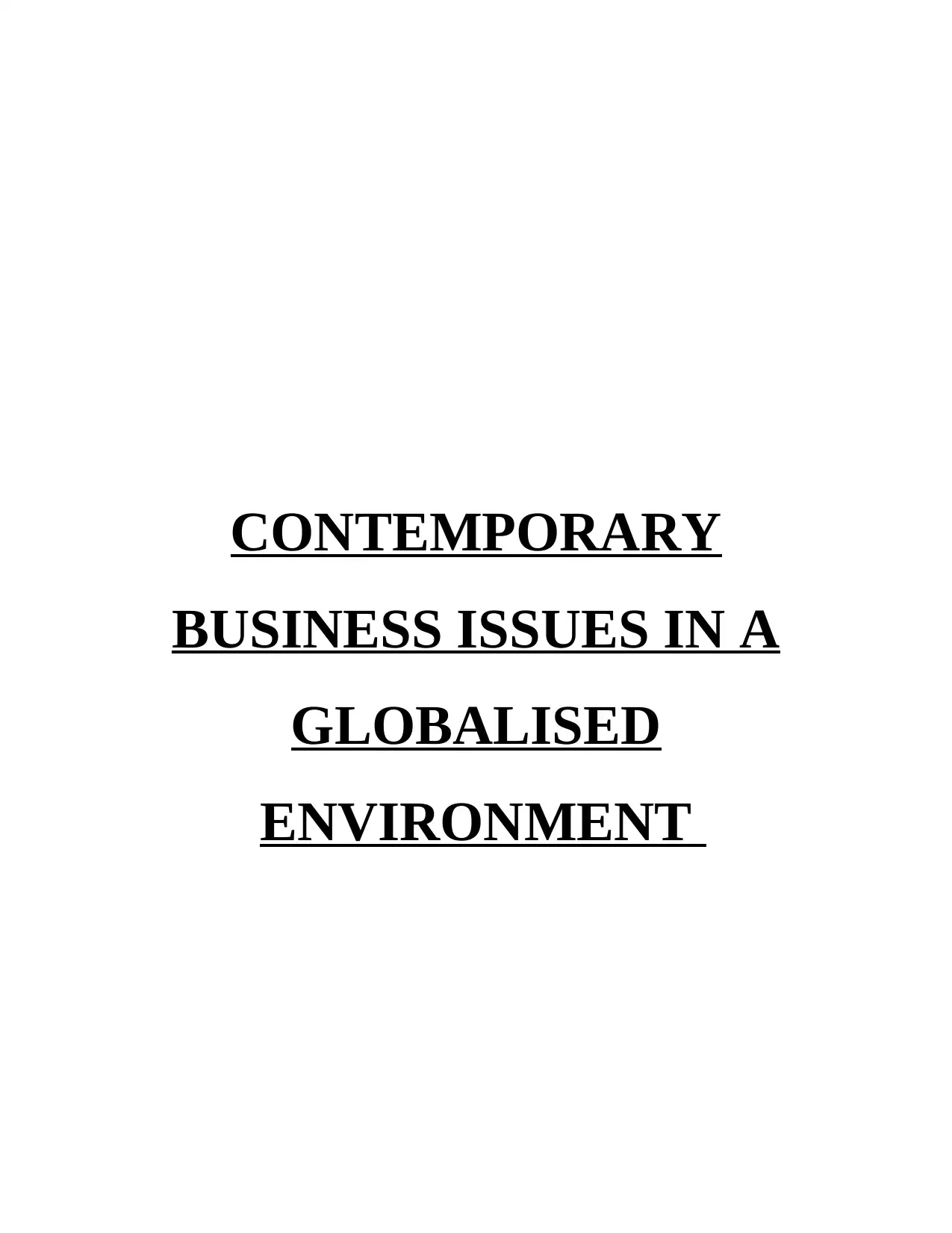
CONTEMPORARY
BUSINESS ISSUES IN A
GLOBALISED
ENVIRONMENT
BUSINESS ISSUES IN A
GLOBALISED
ENVIRONMENT
Paraphrase This Document
Need a fresh take? Get an instant paraphrase of this document with our AI Paraphraser
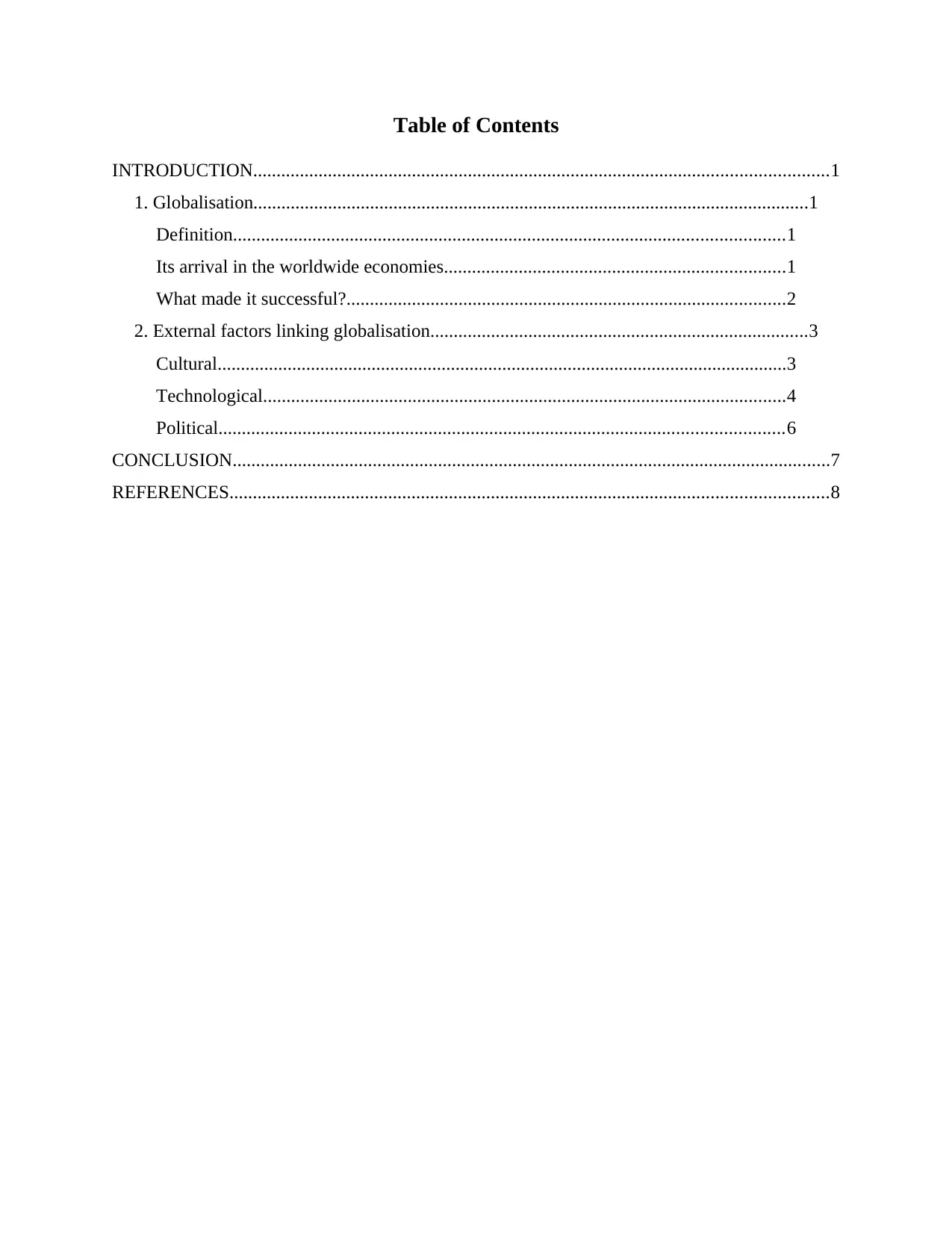
Table of Contents
INTRODUCTION...........................................................................................................................1
1. Globalisation.......................................................................................................................1
Definition......................................................................................................................1
Its arrival in the worldwide economies.........................................................................1
What made it successful?..............................................................................................2
2. External factors linking globalisation.................................................................................3
Cultural..........................................................................................................................3
Technological................................................................................................................4
Political.........................................................................................................................6
CONCLUSION................................................................................................................................7
REFERENCES................................................................................................................................8
INTRODUCTION...........................................................................................................................1
1. Globalisation.......................................................................................................................1
Definition......................................................................................................................1
Its arrival in the worldwide economies.........................................................................1
What made it successful?..............................................................................................2
2. External factors linking globalisation.................................................................................3
Cultural..........................................................................................................................3
Technological................................................................................................................4
Political.........................................................................................................................6
CONCLUSION................................................................................................................................7
REFERENCES................................................................................................................................8

INTRODUCTION
Globalisation has changed the way we see world today. It has brought a number of
services and products from one end to another to consumers worldwide. The below report will
discuss globalisation briefly and showcase the important factors impacting countries globally.
The report will create an awareness of global contemporary issues within the context of global
environment. Also, it includes a brief discussion as how globalisation has impacted the growth of
worldwide economies. The preferences of people across the societies and how they have been
changed since the arrival of globalisation. The report also puts light on the knowledge of the
impact of globalisation on individual, national and international contexts. Along with it, it tends
to develop an understanding as how external factors such as socio-cultural, political and
ecological impact globalisation. The report will help one to evaluate an understanding on
globalisation and its need within today's consumers around the world.
1. Globalisation
Definition
Globalisation is known as the process of integration and interaction among the
governments, people and companies across the globe. It is also termed as a capitalist expansion
which has combined the national and local economies into an economy that is global and
unregulated(Dees, 2017). The growth in globalisation has been observed because of the advances
in communication and transportation. Globalisation has increased the growth in communication
and transportation and the world has seen an increased interaction between a variety of cultures,
trade connections and ideas and as well.
Its arrival in the worldwide economies
In ancient times people tend to survive within the resources available within their towns,
cities and areas in which they resided. For them, there was an easy availability of things they
wanted or desired to fulfil their needs and demands. As the world saw a growth in population,
these people looked for more resources to fulfil the needs and demands of the residing
population. They started outsourcing the materials required to fulfil these needs and demands. It
1
Globalisation has changed the way we see world today. It has brought a number of
services and products from one end to another to consumers worldwide. The below report will
discuss globalisation briefly and showcase the important factors impacting countries globally.
The report will create an awareness of global contemporary issues within the context of global
environment. Also, it includes a brief discussion as how globalisation has impacted the growth of
worldwide economies. The preferences of people across the societies and how they have been
changed since the arrival of globalisation. The report also puts light on the knowledge of the
impact of globalisation on individual, national and international contexts. Along with it, it tends
to develop an understanding as how external factors such as socio-cultural, political and
ecological impact globalisation. The report will help one to evaluate an understanding on
globalisation and its need within today's consumers around the world.
1. Globalisation
Definition
Globalisation is known as the process of integration and interaction among the
governments, people and companies across the globe. It is also termed as a capitalist expansion
which has combined the national and local economies into an economy that is global and
unregulated(Dees, 2017). The growth in globalisation has been observed because of the advances
in communication and transportation. Globalisation has increased the growth in communication
and transportation and the world has seen an increased interaction between a variety of cultures,
trade connections and ideas and as well.
Its arrival in the worldwide economies
In ancient times people tend to survive within the resources available within their towns,
cities and areas in which they resided. For them, there was an easy availability of things they
wanted or desired to fulfil their needs and demands. As the world saw a growth in population,
these people looked for more resources to fulfil the needs and demands of the residing
population. They started outsourcing the materials required to fulfil these needs and demands. It
1
⊘ This is a preview!⊘
Do you want full access?
Subscribe today to unlock all pages.

Trusted by 1+ million students worldwide
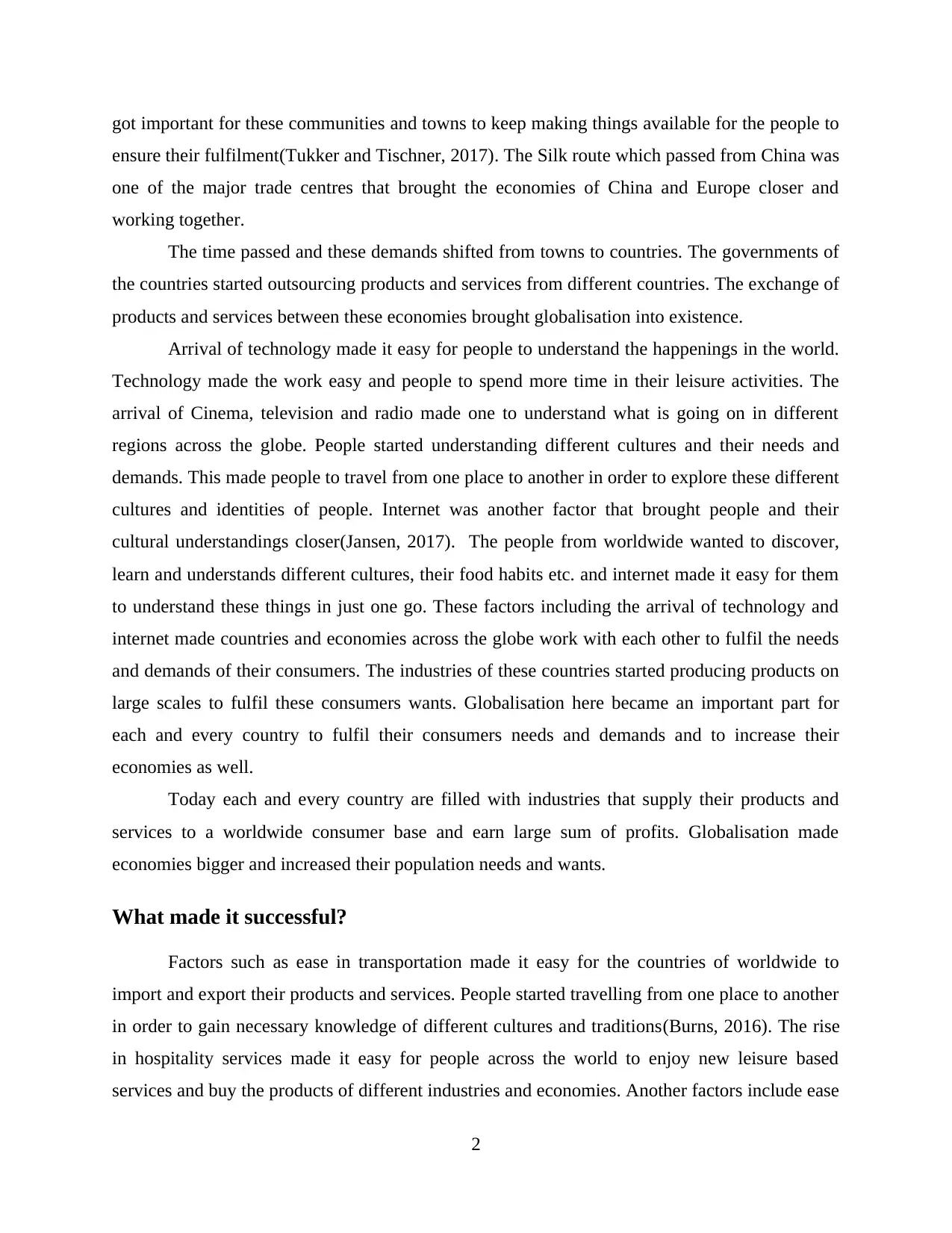
got important for these communities and towns to keep making things available for the people to
ensure their fulfilment(Tukker and Tischner, 2017). The Silk route which passed from China was
one of the major trade centres that brought the economies of China and Europe closer and
working together.
The time passed and these demands shifted from towns to countries. The governments of
the countries started outsourcing products and services from different countries. The exchange of
products and services between these economies brought globalisation into existence.
Arrival of technology made it easy for people to understand the happenings in the world.
Technology made the work easy and people to spend more time in their leisure activities. The
arrival of Cinema, television and radio made one to understand what is going on in different
regions across the globe. People started understanding different cultures and their needs and
demands. This made people to travel from one place to another in order to explore these different
cultures and identities of people. Internet was another factor that brought people and their
cultural understandings closer(Jansen, 2017). The people from worldwide wanted to discover,
learn and understands different cultures, their food habits etc. and internet made it easy for them
to understand these things in just one go. These factors including the arrival of technology and
internet made countries and economies across the globe work with each other to fulfil the needs
and demands of their consumers. The industries of these countries started producing products on
large scales to fulfil these consumers wants. Globalisation here became an important part for
each and every country to fulfil their consumers needs and demands and to increase their
economies as well.
Today each and every country are filled with industries that supply their products and
services to a worldwide consumer base and earn large sum of profits. Globalisation made
economies bigger and increased their population needs and wants.
What made it successful?
Factors such as ease in transportation made it easy for the countries of worldwide to
import and export their products and services. People started travelling from one place to another
in order to gain necessary knowledge of different cultures and traditions(Burns, 2016). The rise
in hospitality services made it easy for people across the world to enjoy new leisure based
services and buy the products of different industries and economies. Another factors include ease
2
ensure their fulfilment(Tukker and Tischner, 2017). The Silk route which passed from China was
one of the major trade centres that brought the economies of China and Europe closer and
working together.
The time passed and these demands shifted from towns to countries. The governments of
the countries started outsourcing products and services from different countries. The exchange of
products and services between these economies brought globalisation into existence.
Arrival of technology made it easy for people to understand the happenings in the world.
Technology made the work easy and people to spend more time in their leisure activities. The
arrival of Cinema, television and radio made one to understand what is going on in different
regions across the globe. People started understanding different cultures and their needs and
demands. This made people to travel from one place to another in order to explore these different
cultures and identities of people. Internet was another factor that brought people and their
cultural understandings closer(Jansen, 2017). The people from worldwide wanted to discover,
learn and understands different cultures, their food habits etc. and internet made it easy for them
to understand these things in just one go. These factors including the arrival of technology and
internet made countries and economies across the globe work with each other to fulfil the needs
and demands of their consumers. The industries of these countries started producing products on
large scales to fulfil these consumers wants. Globalisation here became an important part for
each and every country to fulfil their consumers needs and demands and to increase their
economies as well.
Today each and every country are filled with industries that supply their products and
services to a worldwide consumer base and earn large sum of profits. Globalisation made
economies bigger and increased their population needs and wants.
What made it successful?
Factors such as ease in transportation made it easy for the countries of worldwide to
import and export their products and services. People started travelling from one place to another
in order to gain necessary knowledge of different cultures and traditions(Burns, 2016). The rise
in hospitality services made it easy for people across the world to enjoy new leisure based
services and buy the products of different industries and economies. Another factors include ease
2
Paraphrase This Document
Need a fresh take? Get an instant paraphrase of this document with our AI Paraphraser
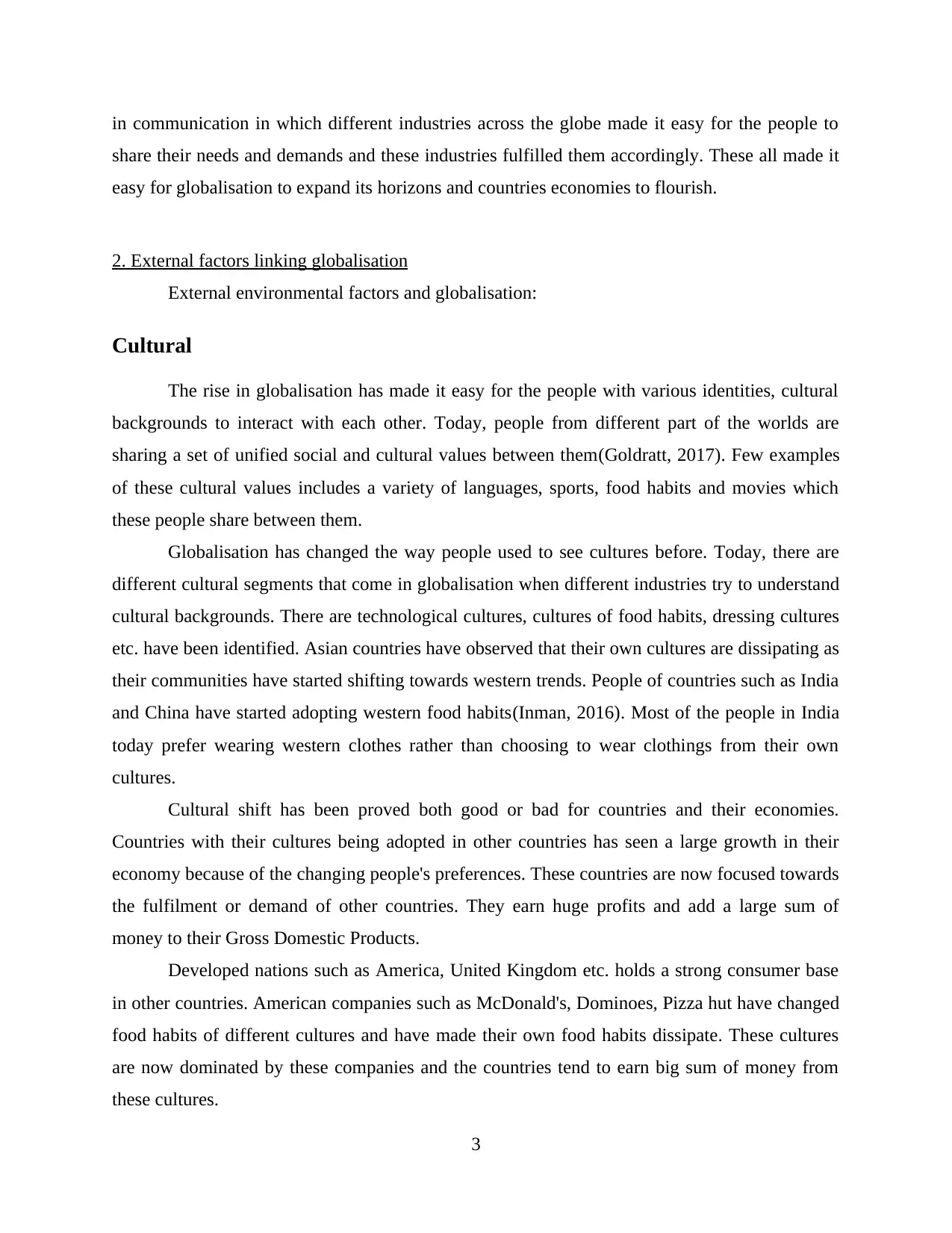
in communication in which different industries across the globe made it easy for the people to
share their needs and demands and these industries fulfilled them accordingly. These all made it
easy for globalisation to expand its horizons and countries economies to flourish.
2. External factors linking globalisation
External environmental factors and globalisation:
Cultural
The rise in globalisation has made it easy for the people with various identities, cultural
backgrounds to interact with each other. Today, people from different part of the worlds are
sharing a set of unified social and cultural values between them(Goldratt, 2017). Few examples
of these cultural values includes a variety of languages, sports, food habits and movies which
these people share between them.
Globalisation has changed the way people used to see cultures before. Today, there are
different cultural segments that come in globalisation when different industries try to understand
cultural backgrounds. There are technological cultures, cultures of food habits, dressing cultures
etc. have been identified. Asian countries have observed that their own cultures are dissipating as
their communities have started shifting towards western trends. People of countries such as India
and China have started adopting western food habits(Inman, 2016). Most of the people in India
today prefer wearing western clothes rather than choosing to wear clothings from their own
cultures.
Cultural shift has been proved both good or bad for countries and their economies.
Countries with their cultures being adopted in other countries has seen a large growth in their
economy because of the changing people's preferences. These countries are now focused towards
the fulfilment or demand of other countries. They earn huge profits and add a large sum of
money to their Gross Domestic Products.
Developed nations such as America, United Kingdom etc. holds a strong consumer base
in other countries. American companies such as McDonald's, Dominoes, Pizza hut have changed
food habits of different cultures and have made their own food habits dissipate. These cultures
are now dominated by these companies and the countries tend to earn big sum of money from
these cultures.
3
share their needs and demands and these industries fulfilled them accordingly. These all made it
easy for globalisation to expand its horizons and countries economies to flourish.
2. External factors linking globalisation
External environmental factors and globalisation:
Cultural
The rise in globalisation has made it easy for the people with various identities, cultural
backgrounds to interact with each other. Today, people from different part of the worlds are
sharing a set of unified social and cultural values between them(Goldratt, 2017). Few examples
of these cultural values includes a variety of languages, sports, food habits and movies which
these people share between them.
Globalisation has changed the way people used to see cultures before. Today, there are
different cultural segments that come in globalisation when different industries try to understand
cultural backgrounds. There are technological cultures, cultures of food habits, dressing cultures
etc. have been identified. Asian countries have observed that their own cultures are dissipating as
their communities have started shifting towards western trends. People of countries such as India
and China have started adopting western food habits(Inman, 2016). Most of the people in India
today prefer wearing western clothes rather than choosing to wear clothings from their own
cultures.
Cultural shift has been proved both good or bad for countries and their economies.
Countries with their cultures being adopted in other countries has seen a large growth in their
economy because of the changing people's preferences. These countries are now focused towards
the fulfilment or demand of other countries. They earn huge profits and add a large sum of
money to their Gross Domestic Products.
Developed nations such as America, United Kingdom etc. holds a strong consumer base
in other countries. American companies such as McDonald's, Dominoes, Pizza hut have changed
food habits of different cultures and have made their own food habits dissipate. These cultures
are now dominated by these companies and the countries tend to earn big sum of money from
these cultures.
3
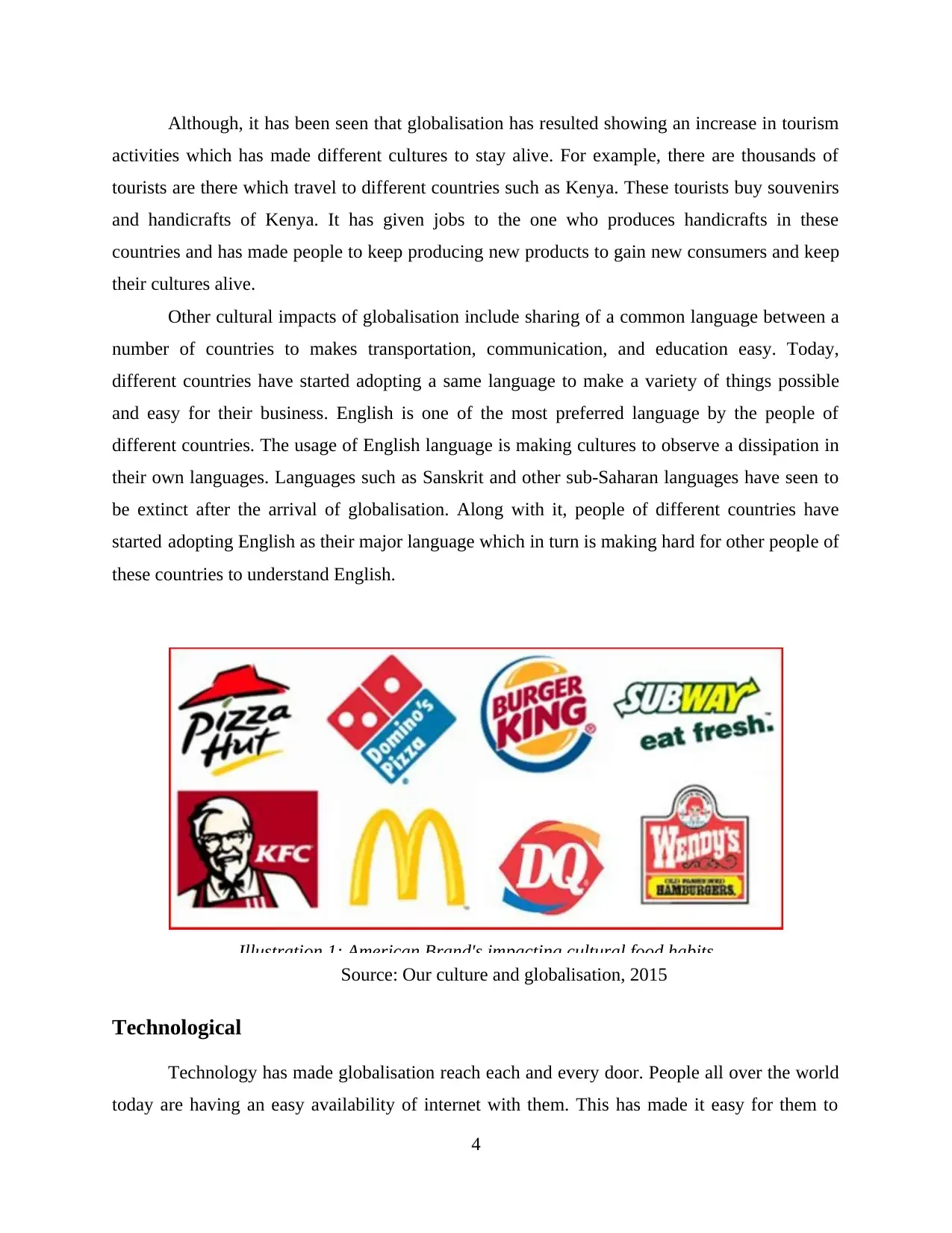
Although, it has been seen that globalisation has resulted showing an increase in tourism
activities which has made different cultures to stay alive. For example, there are thousands of
tourists are there which travel to different countries such as Kenya. These tourists buy souvenirs
and handicrafts of Kenya. It has given jobs to the one who produces handicrafts in these
countries and has made people to keep producing new products to gain new consumers and keep
their cultures alive.
Other cultural impacts of globalisation include sharing of a common language between a
number of countries to makes transportation, communication, and education easy. Today,
different countries have started adopting a same language to make a variety of things possible
and easy for their business. English is one of the most preferred language by the people of
different countries. The usage of English language is making cultures to observe a dissipation in
their own languages. Languages such as Sanskrit and other sub-Saharan languages have seen to
be extinct after the arrival of globalisation. Along with it, people of different countries have
started adopting English as their major language which in turn is making hard for other people of
these countries to understand English.
Source: Our culture and globalisation, 2015
Technological
Technology has made globalisation reach each and every door. People all over the world
today are having an easy availability of internet with them. This has made it easy for them to
4
Illustration 1: American Brand's impacting cultural food habits
activities which has made different cultures to stay alive. For example, there are thousands of
tourists are there which travel to different countries such as Kenya. These tourists buy souvenirs
and handicrafts of Kenya. It has given jobs to the one who produces handicrafts in these
countries and has made people to keep producing new products to gain new consumers and keep
their cultures alive.
Other cultural impacts of globalisation include sharing of a common language between a
number of countries to makes transportation, communication, and education easy. Today,
different countries have started adopting a same language to make a variety of things possible
and easy for their business. English is one of the most preferred language by the people of
different countries. The usage of English language is making cultures to observe a dissipation in
their own languages. Languages such as Sanskrit and other sub-Saharan languages have seen to
be extinct after the arrival of globalisation. Along with it, people of different countries have
started adopting English as their major language which in turn is making hard for other people of
these countries to understand English.
Source: Our culture and globalisation, 2015
Technological
Technology has made globalisation reach each and every door. People all over the world
today are having an easy availability of internet with them. This has made it easy for them to
4
Illustration 1: American Brand's impacting cultural food habits
⊘ This is a preview!⊘
Do you want full access?
Subscribe today to unlock all pages.

Trusted by 1+ million students worldwide
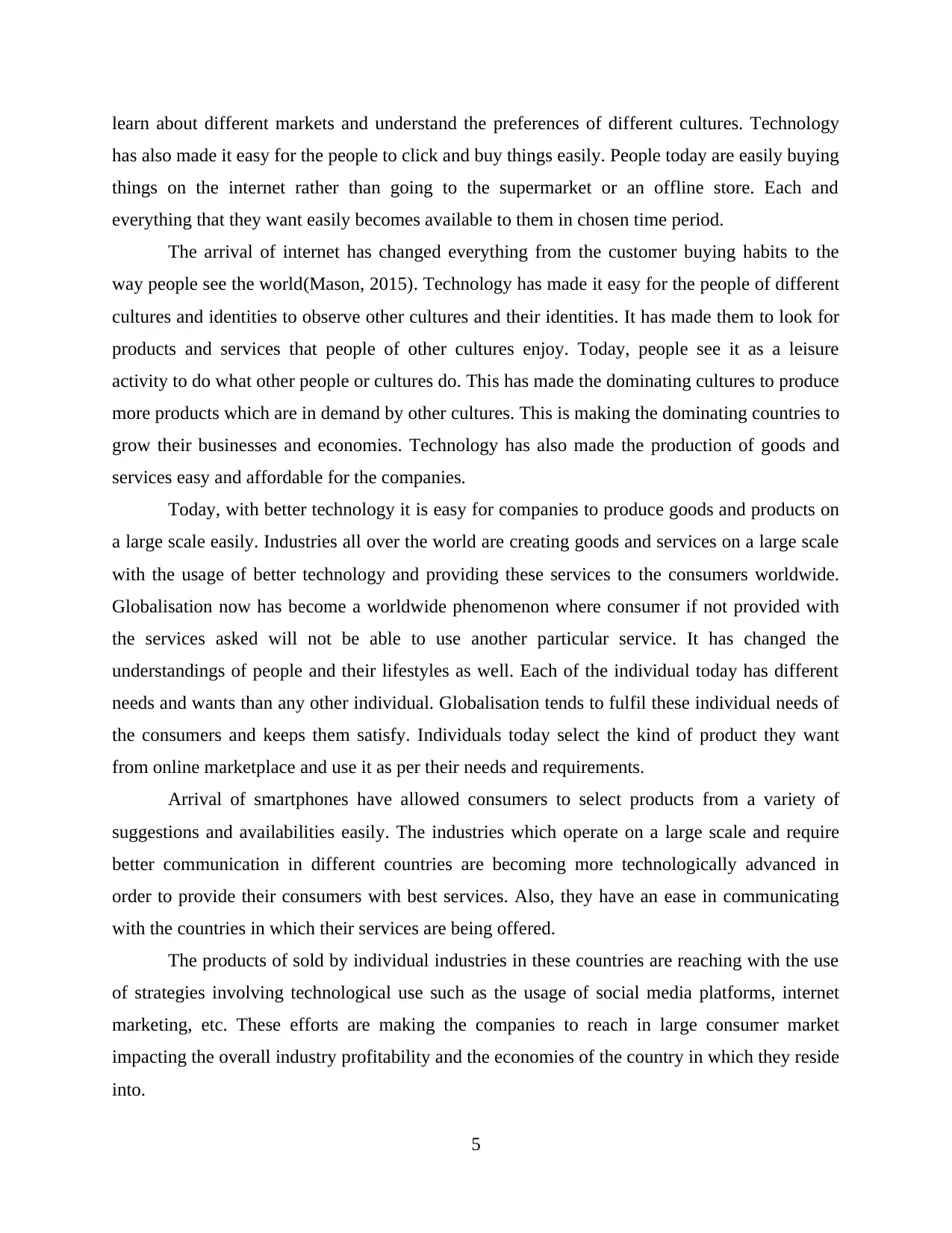
learn about different markets and understand the preferences of different cultures. Technology
has also made it easy for the people to click and buy things easily. People today are easily buying
things on the internet rather than going to the supermarket or an offline store. Each and
everything that they want easily becomes available to them in chosen time period.
The arrival of internet has changed everything from the customer buying habits to the
way people see the world(Mason, 2015). Technology has made it easy for the people of different
cultures and identities to observe other cultures and their identities. It has made them to look for
products and services that people of other cultures enjoy. Today, people see it as a leisure
activity to do what other people or cultures do. This has made the dominating cultures to produce
more products which are in demand by other cultures. This is making the dominating countries to
grow their businesses and economies. Technology has also made the production of goods and
services easy and affordable for the companies.
Today, with better technology it is easy for companies to produce goods and products on
a large scale easily. Industries all over the world are creating goods and services on a large scale
with the usage of better technology and providing these services to the consumers worldwide.
Globalisation now has become a worldwide phenomenon where consumer if not provided with
the services asked will not be able to use another particular service. It has changed the
understandings of people and their lifestyles as well. Each of the individual today has different
needs and wants than any other individual. Globalisation tends to fulfil these individual needs of
the consumers and keeps them satisfy. Individuals today select the kind of product they want
from online marketplace and use it as per their needs and requirements.
Arrival of smartphones have allowed consumers to select products from a variety of
suggestions and availabilities easily. The industries which operate on a large scale and require
better communication in different countries are becoming more technologically advanced in
order to provide their consumers with best services. Also, they have an ease in communicating
with the countries in which their services are being offered.
The products of sold by individual industries in these countries are reaching with the use
of strategies involving technological use such as the usage of social media platforms, internet
marketing, etc. These efforts are making the companies to reach in large consumer market
impacting the overall industry profitability and the economies of the country in which they reside
into.
5
has also made it easy for the people to click and buy things easily. People today are easily buying
things on the internet rather than going to the supermarket or an offline store. Each and
everything that they want easily becomes available to them in chosen time period.
The arrival of internet has changed everything from the customer buying habits to the
way people see the world(Mason, 2015). Technology has made it easy for the people of different
cultures and identities to observe other cultures and their identities. It has made them to look for
products and services that people of other cultures enjoy. Today, people see it as a leisure
activity to do what other people or cultures do. This has made the dominating cultures to produce
more products which are in demand by other cultures. This is making the dominating countries to
grow their businesses and economies. Technology has also made the production of goods and
services easy and affordable for the companies.
Today, with better technology it is easy for companies to produce goods and products on
a large scale easily. Industries all over the world are creating goods and services on a large scale
with the usage of better technology and providing these services to the consumers worldwide.
Globalisation now has become a worldwide phenomenon where consumer if not provided with
the services asked will not be able to use another particular service. It has changed the
understandings of people and their lifestyles as well. Each of the individual today has different
needs and wants than any other individual. Globalisation tends to fulfil these individual needs of
the consumers and keeps them satisfy. Individuals today select the kind of product they want
from online marketplace and use it as per their needs and requirements.
Arrival of smartphones have allowed consumers to select products from a variety of
suggestions and availabilities easily. The industries which operate on a large scale and require
better communication in different countries are becoming more technologically advanced in
order to provide their consumers with best services. Also, they have an ease in communicating
with the countries in which their services are being offered.
The products of sold by individual industries in these countries are reaching with the use
of strategies involving technological use such as the usage of social media platforms, internet
marketing, etc. These efforts are making the companies to reach in large consumer market
impacting the overall industry profitability and the economies of the country in which they reside
into.
5
Paraphrase This Document
Need a fresh take? Get an instant paraphrase of this document with our AI Paraphraser
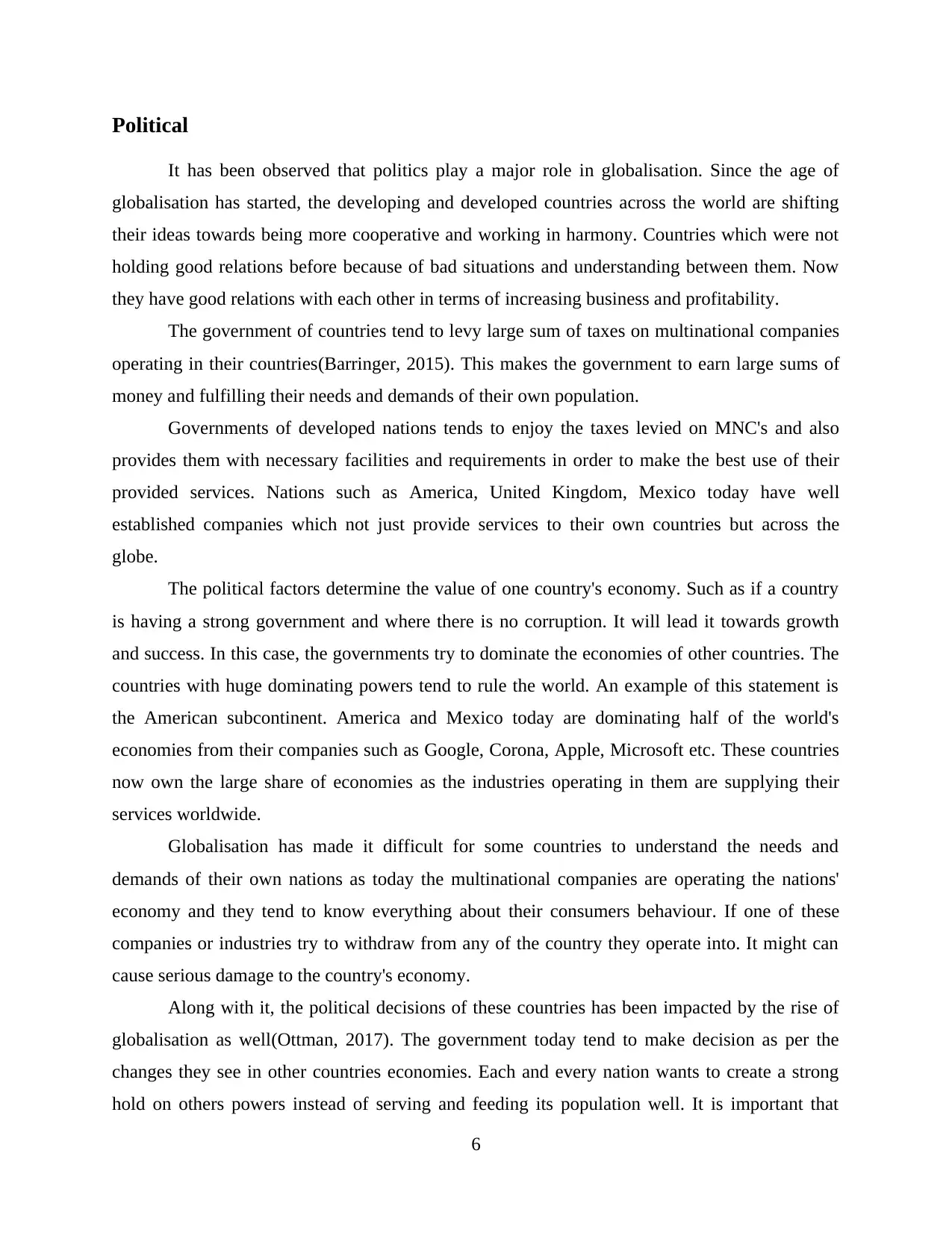
Political
It has been observed that politics play a major role in globalisation. Since the age of
globalisation has started, the developing and developed countries across the world are shifting
their ideas towards being more cooperative and working in harmony. Countries which were not
holding good relations before because of bad situations and understanding between them. Now
they have good relations with each other in terms of increasing business and profitability.
The government of countries tend to levy large sum of taxes on multinational companies
operating in their countries(Barringer, 2015). This makes the government to earn large sums of
money and fulfilling their needs and demands of their own population.
Governments of developed nations tends to enjoy the taxes levied on MNC's and also
provides them with necessary facilities and requirements in order to make the best use of their
provided services. Nations such as America, United Kingdom, Mexico today have well
established companies which not just provide services to their own countries but across the
globe.
The political factors determine the value of one country's economy. Such as if a country
is having a strong government and where there is no corruption. It will lead it towards growth
and success. In this case, the governments try to dominate the economies of other countries. The
countries with huge dominating powers tend to rule the world. An example of this statement is
the American subcontinent. America and Mexico today are dominating half of the world's
economies from their companies such as Google, Corona, Apple, Microsoft etc. These countries
now own the large share of economies as the industries operating in them are supplying their
services worldwide.
Globalisation has made it difficult for some countries to understand the needs and
demands of their own nations as today the multinational companies are operating the nations'
economy and they tend to know everything about their consumers behaviour. If one of these
companies or industries try to withdraw from any of the country they operate into. It might can
cause serious damage to the country's economy.
Along with it, the political decisions of these countries has been impacted by the rise of
globalisation as well(Ottman, 2017). The government today tend to make decision as per the
changes they see in other countries economies. Each and every nation wants to create a strong
hold on others powers instead of serving and feeding its population well. It is important that
6
It has been observed that politics play a major role in globalisation. Since the age of
globalisation has started, the developing and developed countries across the world are shifting
their ideas towards being more cooperative and working in harmony. Countries which were not
holding good relations before because of bad situations and understanding between them. Now
they have good relations with each other in terms of increasing business and profitability.
The government of countries tend to levy large sum of taxes on multinational companies
operating in their countries(Barringer, 2015). This makes the government to earn large sums of
money and fulfilling their needs and demands of their own population.
Governments of developed nations tends to enjoy the taxes levied on MNC's and also
provides them with necessary facilities and requirements in order to make the best use of their
provided services. Nations such as America, United Kingdom, Mexico today have well
established companies which not just provide services to their own countries but across the
globe.
The political factors determine the value of one country's economy. Such as if a country
is having a strong government and where there is no corruption. It will lead it towards growth
and success. In this case, the governments try to dominate the economies of other countries. The
countries with huge dominating powers tend to rule the world. An example of this statement is
the American subcontinent. America and Mexico today are dominating half of the world's
economies from their companies such as Google, Corona, Apple, Microsoft etc. These countries
now own the large share of economies as the industries operating in them are supplying their
services worldwide.
Globalisation has made it difficult for some countries to understand the needs and
demands of their own nations as today the multinational companies are operating the nations'
economy and they tend to know everything about their consumers behaviour. If one of these
companies or industries try to withdraw from any of the country they operate into. It might can
cause serious damage to the country's economy.
Along with it, the political decisions of these countries has been impacted by the rise of
globalisation as well(Ottman, 2017). The government today tend to make decision as per the
changes they see in other countries economies. Each and every nation wants to create a strong
hold on others powers instead of serving and feeding its population well. It is important that
6
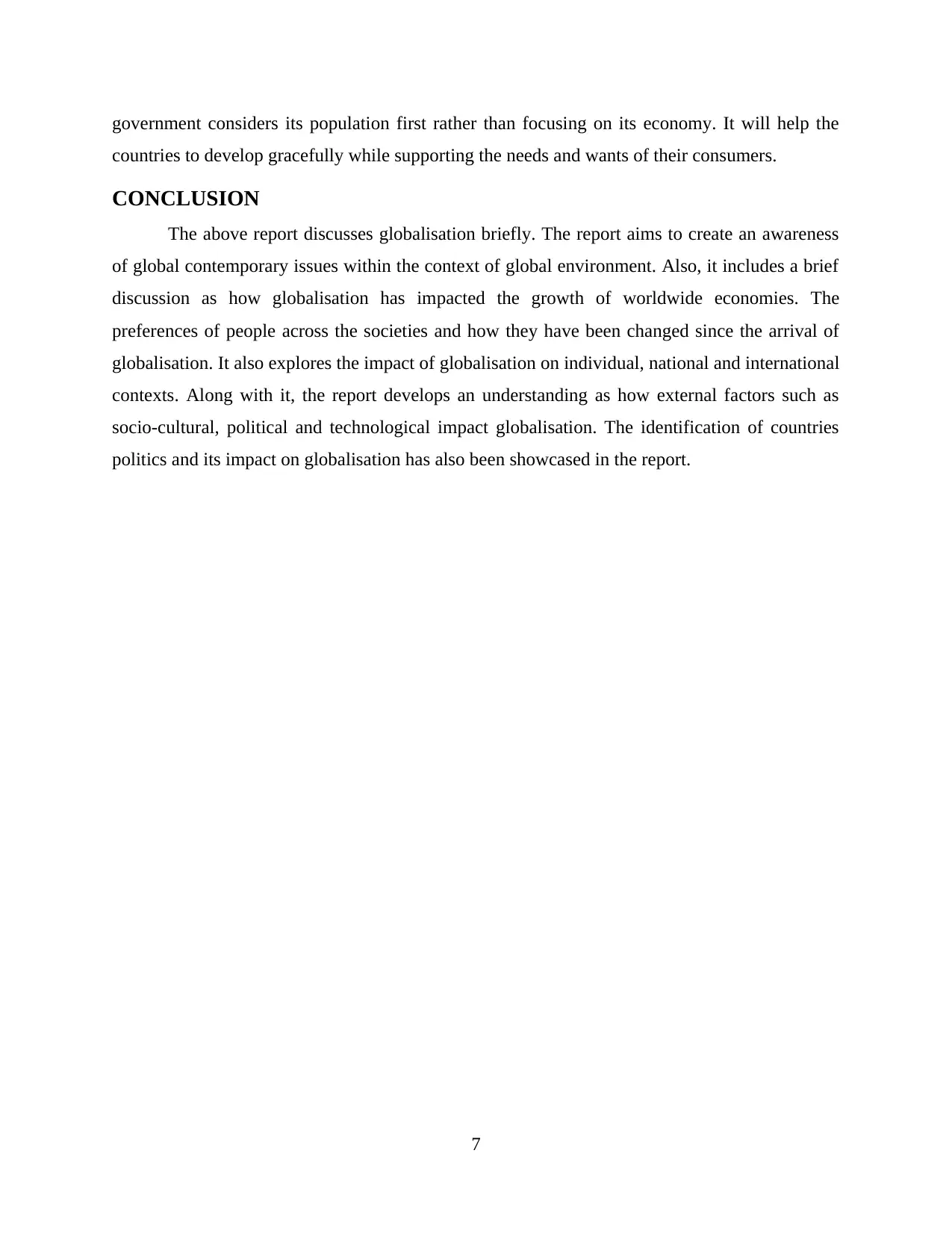
government considers its population first rather than focusing on its economy. It will help the
countries to develop gracefully while supporting the needs and wants of their consumers.
CONCLUSION
The above report discusses globalisation briefly. The report aims to create an awareness
of global contemporary issues within the context of global environment. Also, it includes a brief
discussion as how globalisation has impacted the growth of worldwide economies. The
preferences of people across the societies and how they have been changed since the arrival of
globalisation. It also explores the impact of globalisation on individual, national and international
contexts. Along with it, the report develops an understanding as how external factors such as
socio-cultural, political and technological impact globalisation. The identification of countries
politics and its impact on globalisation has also been showcased in the report.
7
countries to develop gracefully while supporting the needs and wants of their consumers.
CONCLUSION
The above report discusses globalisation briefly. The report aims to create an awareness
of global contemporary issues within the context of global environment. Also, it includes a brief
discussion as how globalisation has impacted the growth of worldwide economies. The
preferences of people across the societies and how they have been changed since the arrival of
globalisation. It also explores the impact of globalisation on individual, national and international
contexts. Along with it, the report develops an understanding as how external factors such as
socio-cultural, political and technological impact globalisation. The identification of countries
politics and its impact on globalisation has also been showcased in the report.
7
⊘ This is a preview!⊘
Do you want full access?
Subscribe today to unlock all pages.

Trusted by 1+ million students worldwide
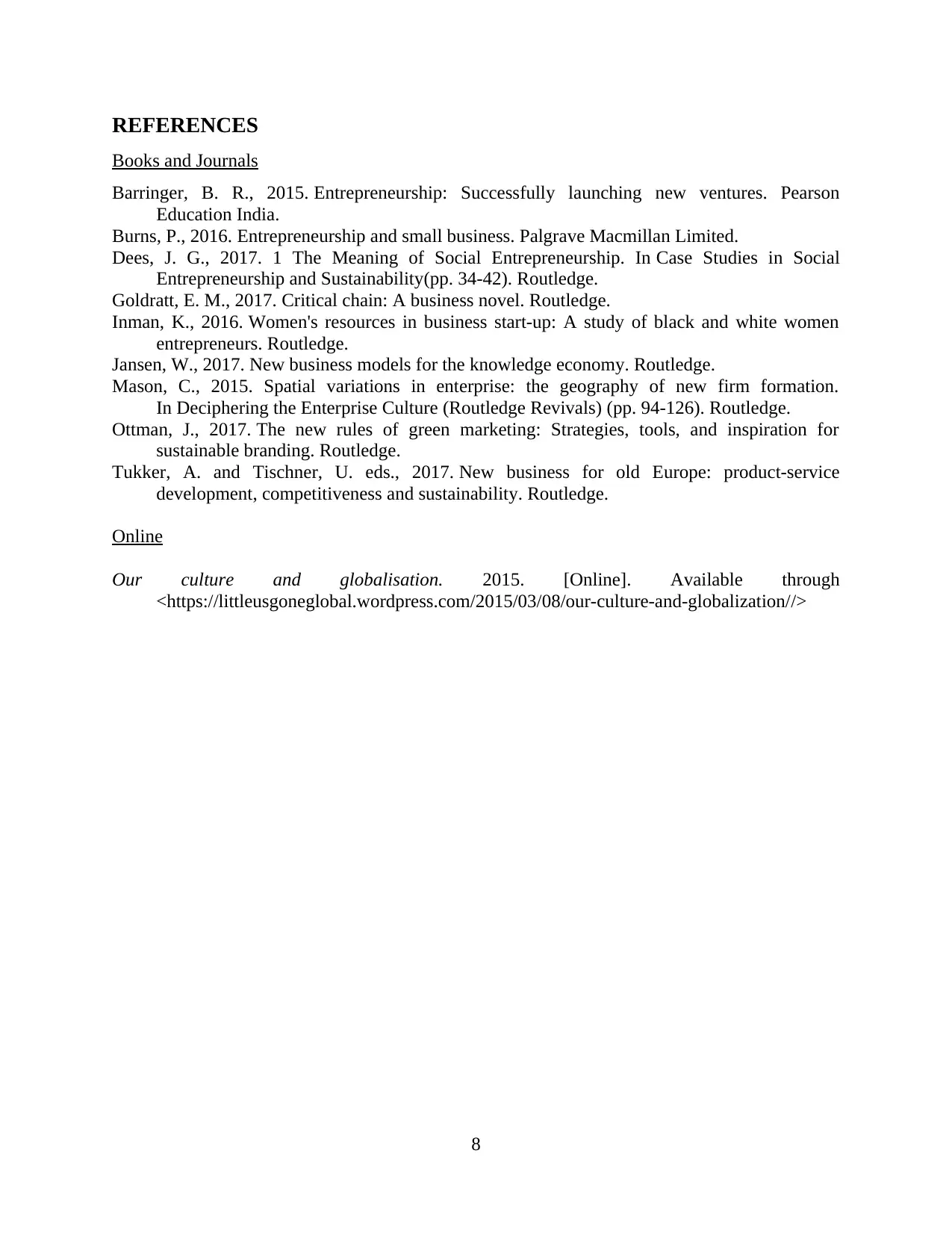
REFERENCES
Books and Journals
Barringer, B. R., 2015. Entrepreneurship: Successfully launching new ventures. Pearson
Education India.
Burns, P., 2016. Entrepreneurship and small business. Palgrave Macmillan Limited.
Dees, J. G., 2017. 1 The Meaning of Social Entrepreneurship. In Case Studies in Social
Entrepreneurship and Sustainability(pp. 34-42). Routledge.
Goldratt, E. M., 2017. Critical chain: A business novel. Routledge.
Inman, K., 2016. Women's resources in business start-up: A study of black and white women
entrepreneurs. Routledge.
Jansen, W., 2017. New business models for the knowledge economy. Routledge.
Mason, C., 2015. Spatial variations in enterprise: the geography of new firm formation.
In Deciphering the Enterprise Culture (Routledge Revivals) (pp. 94-126). Routledge.
Ottman, J., 2017. The new rules of green marketing: Strategies, tools, and inspiration for
sustainable branding. Routledge.
Tukker, A. and Tischner, U. eds., 2017. New business for old Europe: product-service
development, competitiveness and sustainability. Routledge.
Online
Our culture and globalisation. 2015. [Online]. Available through
<https://littleusgoneglobal.wordpress.com/2015/03/08/our-culture-and-globalization//>
8
Books and Journals
Barringer, B. R., 2015. Entrepreneurship: Successfully launching new ventures. Pearson
Education India.
Burns, P., 2016. Entrepreneurship and small business. Palgrave Macmillan Limited.
Dees, J. G., 2017. 1 The Meaning of Social Entrepreneurship. In Case Studies in Social
Entrepreneurship and Sustainability(pp. 34-42). Routledge.
Goldratt, E. M., 2017. Critical chain: A business novel. Routledge.
Inman, K., 2016. Women's resources in business start-up: A study of black and white women
entrepreneurs. Routledge.
Jansen, W., 2017. New business models for the knowledge economy. Routledge.
Mason, C., 2015. Spatial variations in enterprise: the geography of new firm formation.
In Deciphering the Enterprise Culture (Routledge Revivals) (pp. 94-126). Routledge.
Ottman, J., 2017. The new rules of green marketing: Strategies, tools, and inspiration for
sustainable branding. Routledge.
Tukker, A. and Tischner, U. eds., 2017. New business for old Europe: product-service
development, competitiveness and sustainability. Routledge.
Online
Our culture and globalisation. 2015. [Online]. Available through
<https://littleusgoneglobal.wordpress.com/2015/03/08/our-culture-and-globalization//>
8
1 out of 10
Related Documents
Your All-in-One AI-Powered Toolkit for Academic Success.
+13062052269
info@desklib.com
Available 24*7 on WhatsApp / Email
![[object Object]](/_next/static/media/star-bottom.7253800d.svg)
Unlock your academic potential
Copyright © 2020–2026 A2Z Services. All Rights Reserved. Developed and managed by ZUCOL.





